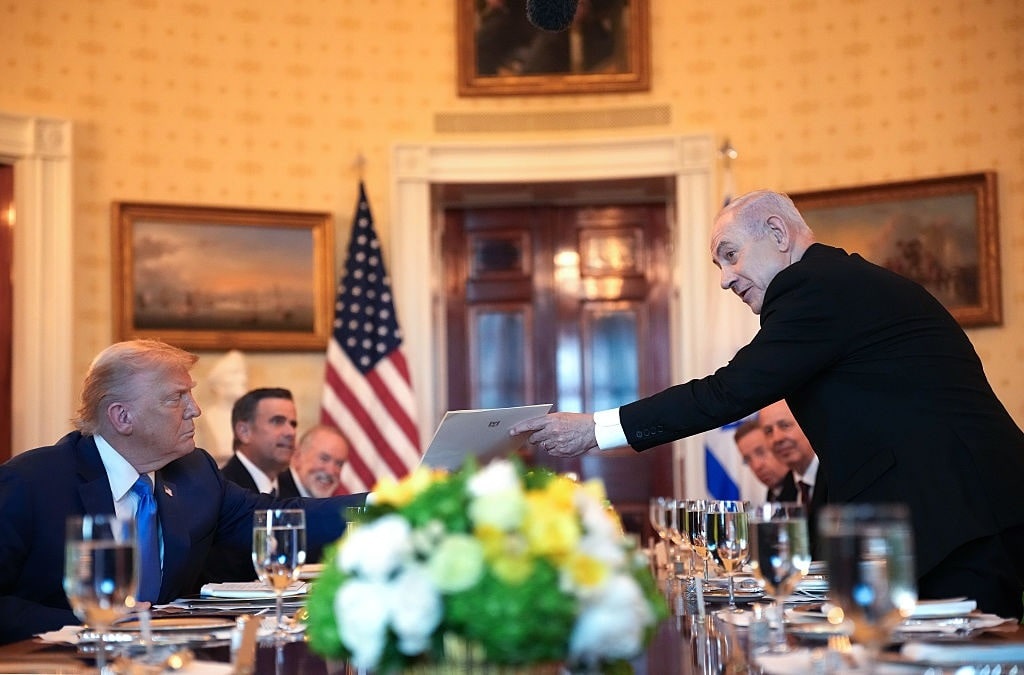
US-Israeli relations shape-shift in the wake of turmoil with intractable Hamas.
Is it a new day in the relationship between Jerusalem and Washington, DC? We will soon find out, in the wake of the private meeting between President Donald Trump and Israeli Prime Minister Benjamin Netanyahu on July 7. With the conclusion of the 12-day war between Israel and Iran, following the destruction of Iran’s nuclear weapons development capability, there is a new backdrop to Israeli-US relations. Yet the resolution to the Gaza conflict remains elusive.
Trump wants a 60-day ceasefire and the return of all the hostages held by Hamas. Netanyahu is open to the ceasefire but is adamant that every vestige of Hamas be obliterated so that there will never be another Oct. 7, 2023, attack on Israel. While the evening dinner between the two leaders provided the tone for the closed-door discussions – with Netanyahu presenting Trump with a Nobel Peace Prize nomination – the meat and bones of the path forward remain, for now, undisclosed. But there are clues.
Netanyahu Assessing Gaza Ceasefire
Turbulence in the Middle East never stops but ebbs and flows. Commander-in-chief Trump keeps ticking off items on his to-do list: (1) Support Israel’s air defense against Iran’s missile attacks, check. (2) Bring the 12-day war to a close, check. (3) Destroy Iran’s near-term capability to produce a nuclear weapon, check. (4) Institute a ceasefire in Gaza that preserves the potential of a lasting peace, in progress. The last item is tricky. As the Daily Caller explained, “The US is pushing a proposal that would establish an initial 60-day ceasefire and secure a partial release of hostages held by Hamas. The plan also calls for increased humanitarian aid to Gaza and lays the groundwork for talks aimed at ending the nearly two-year conflict.”
The sticking points in resolving the Gaza conflict are as they have been since the Israel Defense Force (IDF) first entered Gaza to root out and destroy Hamas: getting the remaining 50 hostages (only 20 are believed to be alive) released, and what to do when hostilities cease. Fox News reported, “Steve Witkoff has been unable to secure a deal that both Hamas and Israel can agree to — the hiccup largely centering around the inability to find a solution that ends Israeli military operations as well as establishes a ‘day after’ plan for Gaza.”
The IDF cannot see a situation where it departs entirely from Gaza, fearful that remnants of Hamas could reconstitute the terrorist organization and become a new threat. Nevertheless, there is mounting pressure on Netanyahu from the families of the hostages as well as activists to secure a ceasefire-for-hostages deal. But not all is depressing regarding the ceasefire talks with Hamas. Netanyahu is banking on his discussions with Trump leading to an improvement in the outlook for a ceasefire.
Iran has been quiet in the aftermath of US and Israeli airstrikes. There have been reports that Tehran’s leadership is seeking to revive peace negotiations. The stumbling block is that such feelers are always accompanied by the insistence that Israel won’t attack Iran again. This is not acceptable to the Israeli state. Let’s say Iran breaks a truce by launching ballistic missiles; Israel will respond with devastating results for Iran. Trump is determined to establish lasting peace in both Gaza and with Iran and revitalize the Abraham Accords to include Saudi Arabia. As it stands, the Kingdom is not going to entertain a relationship with Israel while the fighting in Gaza continues.
Regional Strategy
On a regional level, consideration must be given to what to do about the Iran-sponsored Houthi terrorists in Yemen. On July 6, the Houthis attacked the Liberian-flagged vessel Magic Seas, setting the ship ablaze. The Houthis also launched ballistic missiles at Israel. This renewal of attacks in the Red Sea makes dealing effectively with Iran as a regional power more complicated. Trump and Netanyahu likely discussed how to deal with the Houthis in a strategic way that includes pressuring Iran to cease its support.
Until we get a readout from the private meeting between Trump and Netanyahu, we won’t know how close the president and the prime minister came to a mutually agreeable peace process to deal with Hamas.
The views expressed are those of the author and not of any other affiliate.
Liberty Nation does not endorse candidates, campaigns, or legislation, and this presentation is no endorsement.

















